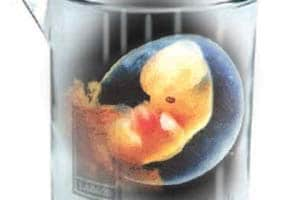
Mumbai:
Following the seizure of nitrogen containers bearing frozen embryos from couples from the US and South Africa at the Mumbai airport, a city doctor is now seeking audience with the Central Board of Excise and Customs to regularise embryo import.
Dr Hrishikesh Pai, who is part of the In Vitro Fertilisation (IVF) team at Lilavati Hospital has cancelled all other appointments with couples abroad who had chosen to send over their frozen embryos, which would then be transplanted into the womb of an Indian surrogate.
"We're taking no chances. The couples are upset but the disappointment of the couples whose embryos were sent back is more. As far as we're concerned, we've been doing this for two years and there have never been any problems before," he said, adding that the Customs manual did not specifically mention any restrictions with regard to human embryos.
"There are some restrictions on animal and especially, bovine embryos but there is nothing on human embryos. We are now in the process of approaching the Centre to ask for some sort of regulation to be passed on the same."
While custom officials maintained that the handlers of the nitrogen containers, now sent back, did not have the requisite paperwork, IVF experts maintain that there is nothing that forbids the import of embryos.
"There is a clear clause in the Assisted Reproductive Technologies bill that prevent the export of Indian embryos, there is nothing that says anything about the import," said Dr Pushpa Bhargava who was part of the bill's drafting committee.
Meanwhile, other infertility doctors in the city agree that some consensus must be reached to erase ambiguity concerning the matter. "This is a grey area that needs some clarity," said Dr Indira Hinduja, who created the city's first test tube baby. Hinduja explains that she personally does not accept frozen embryos.
"If the couple is spending so much on a surrogate they can fly down for an IVF too. An embryo is after all, a living being, and there are so many risks linked with its transport. However, for now, there is no law telling us what the regulation concerning its import is, and so the sooner something is done, the better it will be for everyone," she said.
Dr Hrishikesh Pai, who is part of the In Vitro Fertilisation (IVF) team at Lilavati Hospital has cancelled all other appointments with couples abroad who had chosen to send over their frozen embryos, which would then be transplanted into the womb of an Indian surrogate.
"We're taking no chances. The couples are upset but the disappointment of the couples whose embryos were sent back is more. As far as we're concerned, we've been doing this for two years and there have never been any problems before," he said, adding that the Customs manual did not specifically mention any restrictions with regard to human embryos.
"There are some restrictions on animal and especially, bovine embryos but there is nothing on human embryos. We are now in the process of approaching the Centre to ask for some sort of regulation to be passed on the same."
While custom officials maintained that the handlers of the nitrogen containers, now sent back, did not have the requisite paperwork, IVF experts maintain that there is nothing that forbids the import of embryos.
"There is a clear clause in the Assisted Reproductive Technologies bill that prevent the export of Indian embryos, there is nothing that says anything about the import," said Dr Pushpa Bhargava who was part of the bill's drafting committee.
Meanwhile, other infertility doctors in the city agree that some consensus must be reached to erase ambiguity concerning the matter. "This is a grey area that needs some clarity," said Dr Indira Hinduja, who created the city's first test tube baby. Hinduja explains that she personally does not accept frozen embryos.
"If the couple is spending so much on a surrogate they can fly down for an IVF too. An embryo is after all, a living being, and there are so many risks linked with its transport. However, for now, there is no law telling us what the regulation concerning its import is, and so the sooner something is done, the better it will be for everyone," she said.
Track Latest News Live on NDTV.com and get news updates from India and around the world

